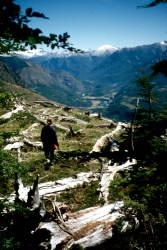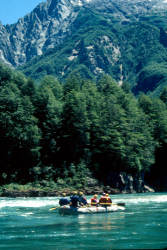What Would You Sacrifice for Cheaper Electricity?
 What if you were offered an opportunity to secure cheap electricity for you and your neighbors by erecting a power plant? Where would you put it? What piece of land would you sacrifice?
What if you were offered an opportunity to secure cheap electricity for you and your neighbors by erecting a power plant? Where would you put it? What piece of land would you sacrifice?
A stark piece of land in a Nevada desert? A river canyon in the Sierra Nevada foothills?
What about your home? The place you were born… in fact, your entire hometown?
That's the kind of choice facing those who live in the Futaleufu Valley in Southern Chile. Due to a dam proposal on the Futaleufu River canyon, the townspeople of Futaleufu could see their valley-the hillsides, the river, the ranches-become nothing but the bottom of a deep lake.
It wasn't until the 1920s that settlers established permanent residence in the Futaleufu region-a valley deep in the Andes Mountains where a cerulean blue river rushes through lush pastures. The Chilean government wanted Chilean people-not Argentineans-to populate this region nearly 500 kilometers away from the city of Santiago. So they offered the land free of charge to anyone hearty enough to make the trek. The area was then devoid of roads and electricity. In fact, dirt roadways have only come to the area in the last 20 years (and only then because former President Augusto Pinochet thought it strategic to build a road from the area into Argentina just in case war broke out among the two countries). Electricity has come in the last decade.
Now the area is being touted as the Telluride of Chile.
 Imagine sky blue water flowing through an emerald green valley, the icy peaks of the Andes scraping the sky, old-world farmhouses dotting the pastures, Chileans riding on horseback to town.
Imagine sky blue water flowing through an emerald green valley, the icy peaks of the Andes scraping the sky, old-world farmhouses dotting the pastures, Chileans riding on horseback to town.
Now imagine Endesa, a power company based in Spain that wants to put this place under water by erecting two dams on the Futaleufu River. Why?
Hydroelectric power, of course.
The Futaleufu River charges through its canyon with 9,000 to 12,000 cfs of snowmelt straight from the rugged Andean cliffs. At one proposed dam site (in the Class IV section of the river), the canyon walls constrict, making it easy to span the gap with a wall of concrete and turbines. Since the water already pushes it's way through this area with great force, it's an optimal spot for power generation.
Except for the fact that doing so will bury the Futaleufu Valley under a large reservoir. If a dam is built at the other proposed site (near the Inferno section), the valley will be spared but the salmon in the river won't: the water released from the dam will be so cold as to kill the salmon now living there.
The power that would be generated by the plants would not even necessarily make electricity in Futaleufu any cheaper (even if it did, one might say it is high-priced in many other ways). Endesa plans to sell the electricity to neighboring Argentina (and, possibly, to a smelting plant that is rumored to be nearing construction further south). The only money Chileans will make on the deal is through taxes on the sale of the electricity. In any case, many have argued that the region's electrical needs are so miniscule they could be satisfied by water wheels constructed on side streams.
Which brings us back to the villagers themselves. What do they think of the dam? How do they feel knowing that, in the space of a few years, what they call "home" could be nothing but a large, man-made puddle?
Some are for it. Not because they wish to see their homeland drowned but because they believe the construction of the dams will bring jobs to the area. And, of course, this is true. At least while the dams are being constructed.
Other natives oppose the plan. They see what's happened to the town of Trevelin-a once bustling town on the far upper stretches of the Futaleufu River which became a ghost town after the construction of a hydroelectric dam in the area.
They also see a different kind of economic savior on the horizon-tourism. The area is considered the Holy Grail for anyone searching for the world's best whitewater. Kayakers and rafters are trickling into the area, bringing with them dollars to spend. The region is also a dream come true for fishermen, horseback riding enthusiasts and mountaineers. Many villagers see tourism as a source of income that has more long-term financial stability than what the building of the dams might offer.
But those who oppose the dam may be fighting powers even bigger than energy giant Endesa. When the former president of your country declares "El progresso viene priemero, la ecolgia despues" ("Progress comes first, ecology afterward)…well, then you know you've got a good fight on your hands.
If you'd like to experience the wonders of Chile and the world class rafting of the Futaleufu, join us in for a whitewater rafting trip in Chile this January.